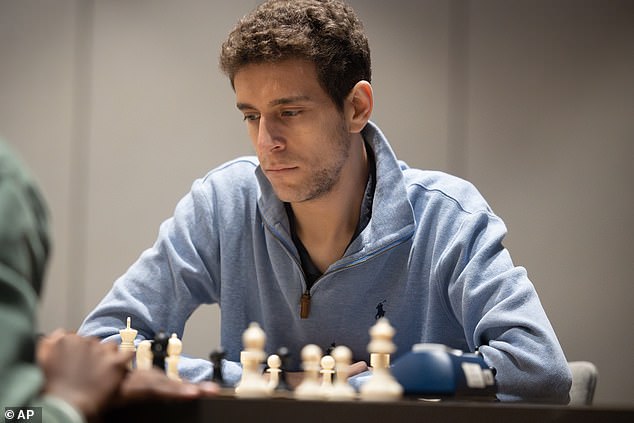The first sign that all was not well came an hour and 13 minutes into the film. Daniel Naroditsky, chess genius and YouTube sensation, placed his head in his hands as the camera continued to whirr. Then he seemed to momentarily fall asleep before suddenly snapping awake and staring into the lens.
At one hour 22 minutes, he slumped over the desk in front of him and thrust his head deep into his T-shirt.
Twelve minutes later the pattern is repeated but this time the young man, who became a grandmaster while still in his teens, ripped off his headphones and, with a deep sigh, said: ‘I just gotta get it together.’ There followed a pause and then he spoke again: ‘Ok, reset. Watch me, watch me, here we go.’
But the ‘reset’ clearly did not work and the spectacle of the distraught Naroditsky made even more uncomfortable viewing.
‘This is not right, this is not right,’ he repeated. We are now two hours and 14 minutes into Daniel Naroditsky’s last ever video and things start to get even more troubling.
Some time after the broadcast finally ended in the early hours of last Saturday morning, Naroditsky, aged just 29, died. Police suspect suicide or an accidental overdose.
It was not until the following evening that his lifeless body slumped on a sofa was discovered by concerned chess-playing friends who went to check on him at his home in North Carolina because he wasn’t answering his phone.
All over the world this week, chess enthusiasts who have been drawn by the American’s passion, enthusiasm and wisdom for the game have been digesting Naroditsky’s tragic unexplained death.
For it has exposed a toxic underbelly in this most cerebral of recreations, a world of bullying and harassment where false claims of cheating are tossed around with abandon.

Daniel Naroditsky, chess genius and YouTube sensation, died on October 19. Police suspect suicide or an accidental overdose
And it is that last manic reel on Naroditsky’s YouTube channel where he interspersed tutorials with live-streamed games that is at the centre of the mystery.
Chess is not the sexiest of subjects. With a reputation as a staid, even nerdish pastime, it is often seen as the preserve of bookish adolescents and older men.
Only once in recent history has chess grabbed the headlines in the way that it does today. That was in 1972 at the height of the Cold War, when the Soviet Union’s long-standing invincibility as chess champions was challenged by a brash American upstart named Bobby Fischer.
His showdown with, and victory over, Russia’s Boris Spassky was one of the great stories of East-West jousting and it became a metaphor for the struggle for supremacy between communism and capitalism.
As the years passed and memories of that epic encounter faded, chess retreated to its niche backwaters. But all that changed during the Covid crisis and what became known as the great pandemic chess boom.
Thanks to a mesmerising performance by the British actress Anya Taylor-Joy in the extraordinary Netflix hit The Queen’s Gambit, chess became fashionable, trendy even.
It drew many who discovered an unexpected beauty to the game to the Twitch streaming service and the channel run by Daniel Naroditsky, known to his many friends and admirers as Danya.
On his online show he would mix taking part in thrilling matches against the best players in the world with extremely informative instruction for chess beginners, intermediaries and even accomplished champions.
What set him apart from many other chess influencers was what one fan describes as his ‘total integrity’. His tutorials came gimmick-free and he was a brilliant explainer, rated one of the best commentators of the game ever to grace a microphone. One chess master said he could ‘explain the game to an ant’.
It also no doubt helped that this Gary Lineker of the world of chess was funny and a great mimic, especially of other top players. He had half a million followers on his YouTube site.

Naroditsky was already a chess champion in 2008, aged 12. Pictured with baseball players of the Oakland Athletics that April
But there is a dark side to chess, where rivalry collides with envy. Many of the leading competitors are often highly strung and sensitive. Position and reputation are fiercely defended, especially when claims of cheating are casually thrown around, amplified as ever by pernicious social media.
And it is the allegations of cheating which so tormented Naroditsky. Police in Charlotte, North Carolina, where he lived in a smart three-bedroom townhouse for which he paid $490,000 (around £368,000) in 2021, and where his body was found, continue to keep an open mind about the cause of death of this otherwise seemingly fit and healthy man.
In The Queen’s Gambit, drug addiction and alcoholism are recurring themes alongside the relentless high-pressure world of competitive chess.
Just like Beth Harmon, the character played by Taylor-Joy in the Netflix mini-series, Naroditsky was a child prodigy who began playing chess aged six and by nine was the No 1 ranked player in the United States, adopted country of his Azerbaijan-born parents. At 17, he reached grandmaster status.
Then, after graduating in history from Stanford University in 2019, Naroditsky became one of the leading figures in the world of so-called bullet chess in which players can have only a minute to make their move.
More than anyone, he helped popularise this fast-paced version of the game, which appealed to a younger audience. His live-streaming inspired hundreds of thousands to take up this exciting form of chess.
At the time of his death Naroditsky was reputed to be the 22nd best bullet player in the world.

Former chess world champion, Russian Grandmaster Vladimir Kramnik, began making a string of accusations against players including Naroditsky who, he said, was cheating in online matches
But with success came jealousy. A year ago, a former chess world champion called Vladimir Kramnik began making a string of accusations against top players, including Naroditsky who, he said, was cheating in online matches.
There was not a shred of evidence to support these wholly spurious claims. Kramnik’s name, however, gave them a bogus air of legitimacy in online forums and on social media threads.
A sulphurous whiff of cheating has always hovered over chess, even at the highest level. In 2022, Norwegian world champion Magnus Carlsen sensationally accused American grandmaster Hans Niemann of cheating – something Niemann has vigorously denied.
It is significant, however, that Niemann had previously admitted to cheating at online chess earlier in his career – and it is in this popular new field, amid claims that computers are used off-camera, that allegations are rife.
In Naroditsky’s case, Kramnik, a Russian based in Switzerland, insinuated that he had conducted a study of his rival’s eyeline when he was playing online games.
He implied that the player had access to ‘chess machines’, computer programmes that calculate millions of moves per second to determine which is the strongest.
Evidence was non-existent. These are grave charges to make about anyone, and Naroditsky, with an impeccable reputation as a grandmaster and commentator, both among elite and amateur players, was deeply wounded and defended his innocence.
However, it became clear that Kramnik’s claims had upset Naroditsky’s psychological balance.
He described the toll they were taking on him: ‘I thought he was going to put out three or four crazy, delusional videos, and then move on to the next target and eventually the chess world would wake the hell up,’ he said in a podcast.

On Naroditsky’s online show he would mix taking part in thrilling matches against the best players in the world with extremely informative instruction for chess beginners, intermediaries and even accomplished champions
‘Unfortunately, the opposite happened, and it became apparent to me that this was no longer a case of me being next in line but a sustained, evil and absolutely unhinged attempt to destroy my life.’
He said he feared people would ‘assume the worst’ if he won matches, adding that Kramnik was ‘one of the most wicked people I have ever dealt with’. Which brings us back to that last haunting footage on the YouTube video.
‘OK, who else wants to receive a beating?’ a wild-eyed Naroditsky declared at just over the two-hour mark of the livestream. The Kramnik accusations were still weighing heavily on his mind.
At two hours 15 minutes, a voice off camera, who is not immediately identified, says: ‘You gotta go to sleep man.’
Naroditsky, who has already played a string of games, replies: ‘I said a 2am curfew. What’s the matter? Five more games, by 2am I am in bed. Please! Let me play.’
Soon after, the voice off screen comes back on and says: ‘I’m going to unplug it if you don’t end it, the stream, not the playing part, the stream.’
At two hours 27 minutes Naroditsky suddenly says: ‘The problem is, ever since the Kramnik stuff, I feel if I start doing well people assume the worst of intentions.
The voice responds: ‘You don’t have anything to prove to those people.’ To which Danya says: ‘The issue is just the lingering effect of it. One final game.’
His last words before turning the camera off were: ‘We’ve got this, all for one and one for all.’
Yesterday, those voices off camera were identified as fellow chess players Peter Giannotos and grandmaster Oleksandr Bortnyk. The two men told the Daily Mail that they convinced their friend to cut the livestream feed and, after chatting with him a little longer, left his home around 3am.
But data from the Chess.com website shows that Naroditsky logged back on and continued playing until 5.39am. And later, on Saturday morning, he took part in an online sponsored chess event. He played more games after the event until 5.03pm.
It was Bortnyk and Giannotos who discovered his body 24 hours later, on Sunday evening. Unable to raise him, they let themselves in after spotting that the TV was on through a window.
The reaction to this tragic death was immediate. Indian Nihil Sarin, one of the young stars of the game and who was one of the last to play with Naroditsky, said Kramnik ‘has kind of literally taken a life’. During his games with Naroditsky, they had talked about other things.
‘He said he was under immense stress due to a lot of baseless accusations – headed by Kramnik of course. Apparently, quite a few others also seem to have joined in. I can totally imagine the pain he was going through.’
American player and world No 2 Hikaru Nakamura was blunt. Kramnik, he posted, should ‘go rot in hell’.
Little seemed to deter Naroditsky’s accuser who, even in the days before his death, posted a series of critical tweets.
‘Typical nowadays [in the] world of chess, the only thing everyone cares about is “looking great” and pretending there are no issues,’ he wrote. In another post referring to Naroditsky’s appearance he wrote: ‘Got the stream episodes. Not a doctor but looks like something “very else” than sleeping pills. Hope, if any, real friends of him will care.’
When the death was made public, he offered this breathless eulogy – ‘Too high price paid’ before declaring that the police should investigate.
Naroditsky’s defenders were incensed. ‘Kramnik is a weasel,’ one wrote on Reddit.
Another declared: ‘Kramnik could have been remembered as one of the all-time greats. Instead, he will be remembered for being a malicious unhinged and actually not very bright man.’
This week, the International Chess Federation announced it would be examining Kramnik’s public attacks on one of the most popular players of his generation.
It is little consolation for Danya’s devastated mother, Elena. She had been planning a family reunion at her home in San Francisco to celebrate the arrival of her older son Alan’s new baby.
Now, she is preparing for her beloved Danya’s funeral.
With the loss of its best-ever ambassador, the question is whether the world of chess can be rescued from its dark spiral and return to its less-complicated, if nerdish, roots.








